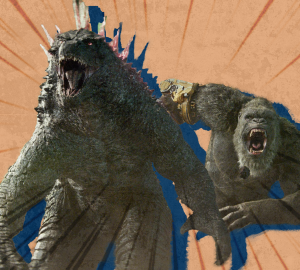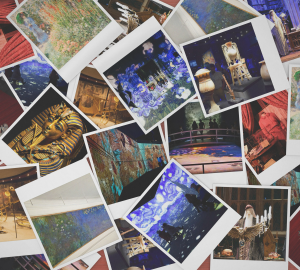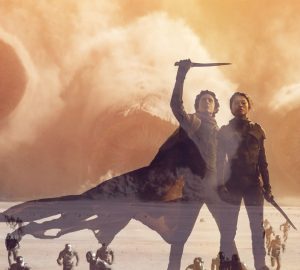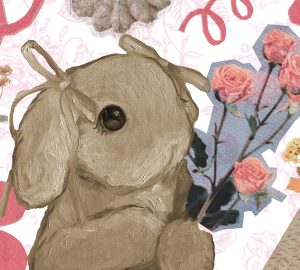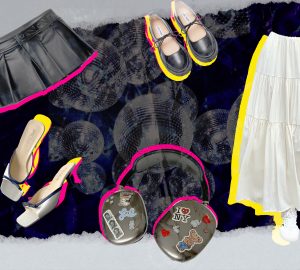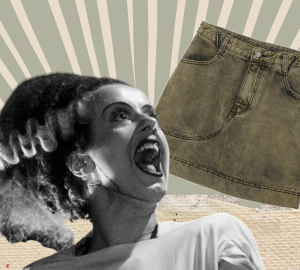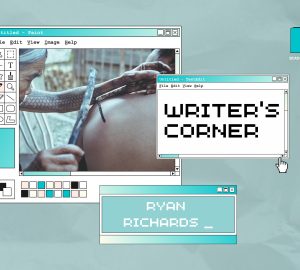Writer’s Corner: ‘Specks of Starlight’
The Writer’s Corner features poetry, essays, short stories, satire and various fiction and non-fiction from SCAD Atlanta students. To submit your own work for the Writer’s Corner, email features@scadconnector.com.

‘Specks of Starlight’ by Alejandro Bastidas.
The closest I’ve been to outer space was in Colombia. Most of the people I know spend the entirety of their lives without catching a glimpse of that humbling phenomenon, and in a way it makes the memory of it more special, as if nature had chosen to give that gift to a select few. There are several observatories scattered across the world, but the one I know is in the Gulf of Morrosquillo, north of my country, hidden from maps and the ever-blinking eyes of satellites. Only this is no literal observatory. It is a lagoon. Or was. I don’t know if it still exists, with the way things are going, and the way things tend to go in this day and age. But it has been immortalized by the gallery of my memories and the sanctuary built by my words, so it will live on forever.
“Some paths are only revealed by moonlight,” said one of the locals. “Useless to travel through them during the day when the magic is invisible.”
I learned that most of the locals hadn’t been born near the lagoon, but had fled southern cities consumed by the armed conflict until they found refuge in the gulf, and now guarded its many secrets. They said that we could only go to the lagoon at night, and had to do so by kayak, as there were no longboats for all of us and no roads on the mangrove swamp anyway. I soon discovered that it is one thing to kayak under the scalding sun when the eye is a compass and the only obstacles are the sore arms, and completely another to kayak in the darkness, guided by instinct and luck. Yet some places are worth diving into the vastness of the unknown for, away from comfort and convenience, and closer to the visceral form of living.
The South American country, not to be confused with the many Columbias in North America.
In a group of thirty students, all of us convinced of our stardom in the planet, we shared countless theories of what could await in the lagoon. As if anyone with our absurd level of ignorance could guess correctly.
I remember my friend Camilo ready for the quest with a headlamp flashlight that covered his forehead, water-proof, and with three different settings of lighting available. He encouraged the rest of us to follow suit and take one for the trip.
“Only if you want fish to jump on your face,” said Lobo, whose real name we did not know, but he walked around the Earth with the certainty of someone who knows every leaf, creature, and rock, so we trusted him to guide us. “They’re attracted by bright light and will slap you hard enough to knock you over the kayak. So, I’ll be at the front guiding the group with a redflashlight and another guide will be at the rear. All you idiots try to stay between us and don’t fall behind.”
Lobo spoke as he twirled his only strand of hair, an attempt of braid at the back of his head, incrusted with random objects from all his travels.
Everyone paired up in seconds, rushing off to find their kayaks and their oars, while I searched in the darkness for friendly faces, only to realize that they’d found other friendlier faces already. Then I found Camilo, his head swiveling much like mine, and we decided to share our loneliness in the kayak. He chose to steer at the back while I served as his eyes at the front. Probably not the brightest idea for a myope to assume the role but we did not consider that at the time.
“I bet we’ll be the first ones to arrive,” Camilo whispered. “I bet we’ll be the first ones to crash.”
“You know, we’re supposed to be a team. But fine, I bet you ten lukas2,” he said and we shook hands on the deal.
The entrance to the mangrove swamp was swift and effortless, most of the pairs chatting and joking around, carried forwards by kisses of wind and the occasional thrust from an oar. The velvet cloak of night was reflected in the sea, as we crossed the blurred line that divided them, rowing through a unanimous darkness. Celestial coordinates flashed in the sky, ever burning millions upon millions of miles away, but the entrance to the swamp blocked the starlight with arching treetops that hugged a narrow strait of water, so the sky seemed fractured and divorced from the moon.
There was enough room for two kayaks to pass through at a time, but no space for maneuvering. Lobo warned us to avoid the edges of the swamp where the roots beckoned in their labyrinthine web for one unlucky kayak to approach. That, of course, turned out to be my own. Camilo steered as I told him to, guided by the kayak ahead of us, its yellow-tipped rear visible enough to follow, but besides that there were only looming shadows that mocked my eyes’ attempt to guess at their shapes.
A rumor spread down the line of kayaks claiming that small caimans swam in the strait. No one seemed eager to dive down and check, for in the unknowable darkness, anything could be lurking. Or perhaps only the light-hungry fish. Only Lobo knew for sure. Our guide was a distant red flicker for us who had fallen behind, a separate vertebrae from the rest of the group. Camilo rowed faster against a sudden current that diverted our course, while I squinted my eyes to try and distinguish where the swamp met the water.
Colloquial expression for Colombian pesos.
I learned then that my quick reflexes made up for my poor eyesight. Something sharp charged for the gap between my eyebrows, and I ducked at once as a thick branch like a tentacle of shadow swooshed over my head. Camilo dodged easily but in those two seconds that passed, we got distracted and carried away by the current, into the underwater claws of the swamp. The kayak tilted sideways as we crashed into it, and I forced my weight into the other side to bring it back down.
“How bad is it?” Camilo yelled.
“No clue,” I said. “Just push away from the swamp with your oar.”
“You did this on purpose, eh? Sneaky bastard just wanted my money.”
“A branch almost impaled my eye, Camilo. I wouldn’t risk my already-terrible eyesight
for ten thousand pesos.” “So dramatic.”
I pushed my own oar into a gap between two roots so the kayak could break free as Camilo kept us away from the unseen edge of the swamp. I wasn’t sure if I’d save us or end up turning the kayak over, my hands clumsy and suddenly sweating, the grip on my oar weak. I smacked the roots until one of them bent and the tip of our kayak was no longer caught, but it took some pushing from the guide at the rear to get us back on track.
“You still owe me, though,” I told Camilo.
The urgency of the moment faded like a bad dream as the strait widened ahead. We were close. Camilo and I rowed quickly to catch up with the others, and in the corner of my eye, bright pearls of blue light seemed to cling to the end of my oar. I looked up to check if the treetops had parted to let starlight creep in, thinking it might have been a reflection, but it was just as dark as before. But not in the water. Every dip of my oar summoned the lights, and the kayaks that minutes before had been concealed in darkness, were now contoured by strings of bright blue.
It was a dream. It was fiction.
It was nature doing what nature does best.
We rowed out of the straight and into a black shield of water encased by the mangrove
swamp in a perfect circle, its fortress from the damaged world beyond. The sky returned, and with it came its jewels, glimmering by the hundreds. More stars than I’d ever seen in my life in the city where smoke and mankind’s poisonous footprint conjured gunpowder skies, and so the dome of stars formed a blinking planetarium, a direct pathway to the irises of the Universe.
We rendezvoused with the group at the center of the lagoon where Lobo showed us how to tie our kayaks together, forming another perfect circle to surround us in the water so no one would wander off.
“I don’t wanna see none of you without a damn life vest,” Lobo said, splashing his Greek god beard with water. “Now go swim, my ducklings.”
There were no caimans lurking in the water. There was starlight that I could catch in my cupped hands for an instant. Such was the magic of bioluminescent plankton scattered all across the lagoon, offering us a show of lights that mimicked the sky, responding to the stimuli of our motions. I dipped my hand into the water and it came alive in shimmering blue, an alien phenomenon to my narrow mind, stirring a current of awe within. I could trace circles of light with my fingertips upon the surface, I could experience the world anew, as if I had unlocked a new color or a new emotion.
I swam away from the group and was chased by the lights as I floated facing the sky, that interminable spectacle of stars, and breathed in the sweetness of the present. The other students sprayed one another with illuminated water, entranced by its magic, and one of them (maybe Camilo) offered to show how he’d discovered the power of farting light.
It was all noise to me.
In that moment, I was an asteroid adrift in the cosmos. In that moment, I was eternal.
My body weightless, my eyes sharper than they’d ever been as starlight beamed onto them, and my mind expanded as the meaning of beauty evolved. But at the same time I shrunk, aware of the immensity of the sky and the space beyond, where lightyears away, those nuclear forges of hydrogen and helium decorated an endless void with their divine glimmer. With so much heat and light that I—a mere microbe—could see them. That day I learned of the resilience of stars, radiating iridescent light, long after death.
Some of my friends think that those burning elements in space are capable of altering their behavior and their fate, as if something so large and celestial would ever bother to spend a sliver of its energy in puny humans and their weekly speculations. But part of me began to understand why many have looked up at the stars for answers. It dawned on me that I was as minuscule to the Universe as the plankton were miniscule to me. And yet, in my human egoism, I was convinced for an instant that the Universe existed just as a gift to my eyes.
The world faded into the back of my mind. It was just the lagoon, the lights around my flailing limbs, and the stars above. The current dragged away all the crushing weight of my fear of being alone and my ceaseless self-doubt, the remnants of remorse from my mistakes, the unclosed wounds from those I have lost and those who have walked away. I was left only with the notion of how stars need the dark in order to shine.
And there was also the question of how many lifeless planets there were between me and those stars. And how many more beyond the ones I couldn’t even see? I, floating in a container of life adorned by organisms with the power to shine, was suddenly aware of the beauty of being and its rare occurrence.
But my sentimental interlude was broken, as it happens to every spell, perhaps by a cold gust of wind or a distant scream. I came back to Earth, because in a way I had left, and was shocked to remember that those last minutes had transpired in Colombia, out of all places. The lagoon was untouched by the unstoppable violence that spread everywhere else, as abundant as the stars, but the only brightness there came from exploding barrels after a gunshot. Sometimes traveling can be a form of escape from such verdicts that surround everyday life. The lagoon seemed to be the anomaly in my country, but after I shed my traditional pessimism and studied the living proof around me, I figured that it wasn’t surprising at all. Colombia was the land of magic realism, and it wasn’t Gabriel’s invention at all. No other place in Latin America had such diversity and richness in nature that blurred the line between dream and reality. I was breathing in a land where miracles—once the fog of violence cleared—were actually commonplace.
But as life in the city reminded us of the constant despair, we became atheists to the possibility of something better. Of someplace untouched.
In Colombia you can float on water that shines like a nebula. In Colombia, a mercenary will kill you for less than what Camilo and I had wagered moments before. How can those two things coexist in the same environment? In what kind of the world is that possible? Perhaps “coexist” isn’t the right word. That implies some form of harmony and cooperation, while violence infects the core of my country and its people.
Places like the lagoon made me believe that there could be more sanctuaries untouched by that sickness. There was no rumor of the fifty-year war there, no posters of missing children, no broken earth from the landmines, and no indigenous leaders butchered in broad daylight. There were specks of starlight in the water, translated as the true essence of my country and its poetry.
So I swam back to my kayak, still weightless, but more aware and more grateful. I caught up with Camilo and Lobo, and before climbing back on the kayak, I traced one final circle of blue light in the water. My signature. No one would ever see it, but I would remember it forever. Or maybe it was a promise to myself, that I would try in any way I could to transfer some of the peace inside the water to my city, the one without any stars. So that the people there might start believing in how beautiful Colombia could be.

